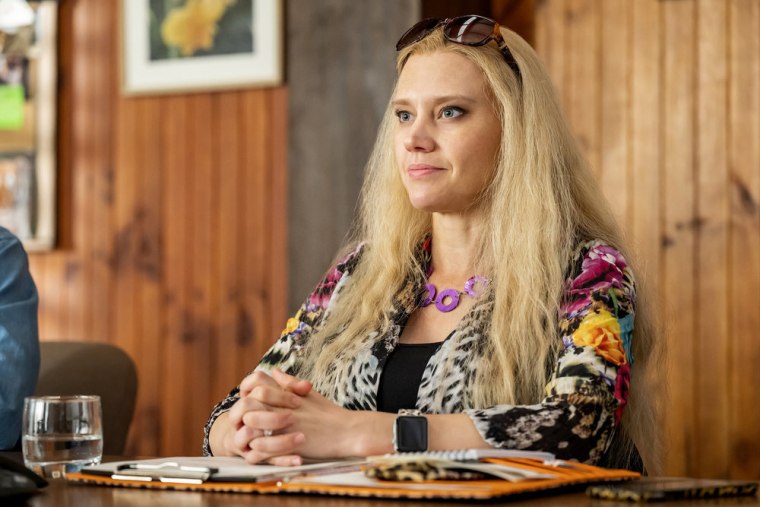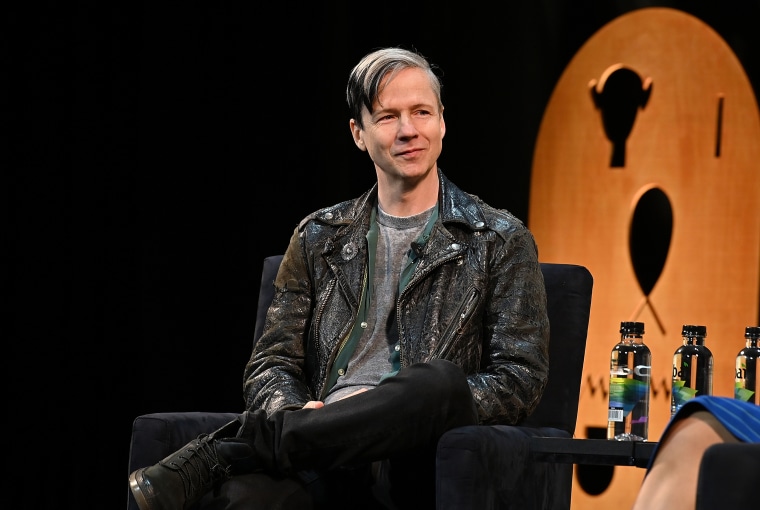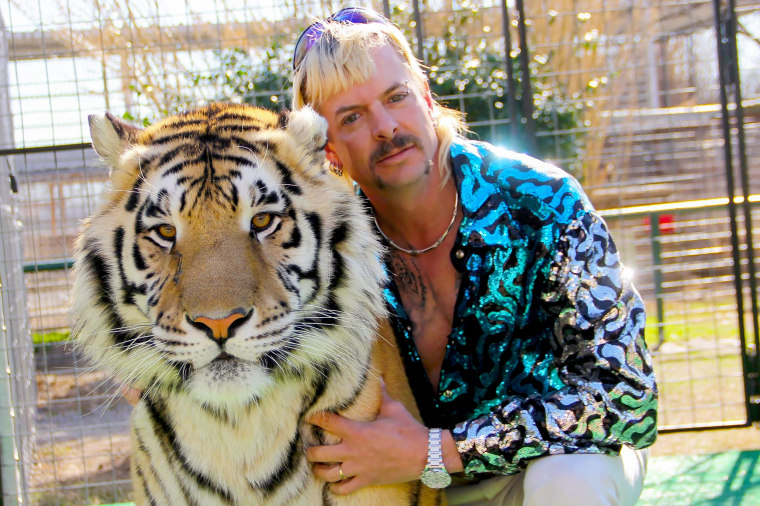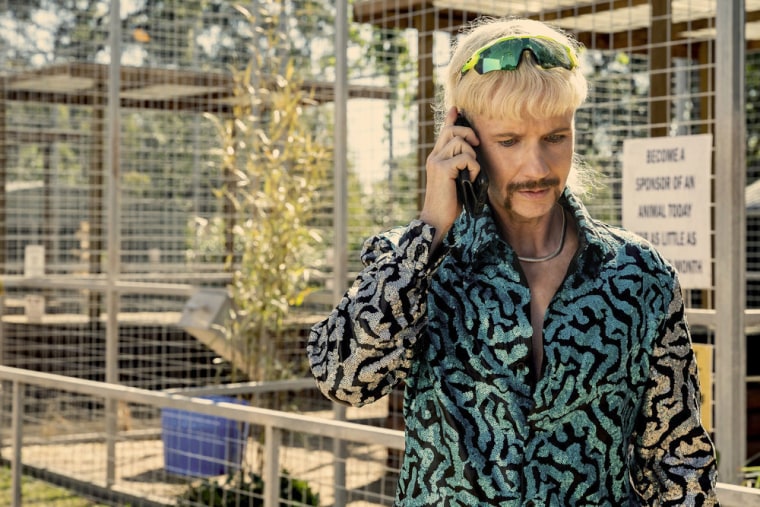The antiheroes of the big cat world are getting the star treatment in “Joe vs. Carole,” the new Peacock series based on the second season of Wondery’s “Over My Dead Body” podcast. The show, which stars heavy-hitters John Cameron Mitchell, Kate McKinnon and Kyle MacLachlan, looks to get at the truth — if not the facts — of the bitter feud that ended in Joe Exotic’s murder-for-hire plot against the Big Cat Rescue founder Carole Baskin. (Peacock and NBC News are both owned by NBCUniversal.)
McKinnon, who plays Baskin, has been one of the reigning stars of “Saturday Night Live” since 2012, giving laugh-out-loud performances in roles ranging from a chain-smoking alien abductee to figures like Ruth Bader Ginsburg and Rudy Giuliani. MacLachlan, who plays Carole’s doting husband, Howard, has had one of the most prolific and varied careers of any actor working today, starring in masterpieces from auteur David Lynch to playing Charlotte’s uptight husband in “Sex and the City.”

In a rare turn as a mainstream lead, Mitchell, the creator of the queer cult classics “Hedwig and the Angry Inch” and “Shortbus,” plays Exotic, the flamboyant zoo owner and big cat breeder made famous by the Netflix series “Tiger King.” When the series debuted in early 2020, Exotic became a kind of American folk hero, relatable in his lust for success and, yet, detestable for the avenues he took to achieve it.
That duality is one of the things that drew Mitchell to the role, which he compares to playing Richard III, the charming, power-hungry usurper in Shakespeare’s cautionary history.
“It was really a hoot to play an antihero that some people hold up as a kind of icon and others see as an animal-hurting attempted murderer — and in between those things is the real person,” Mitchell told NBC News.

Mitchell was so intrigued by the character that he sent in a self-taped audition, his first in 27 years. He said he hasn’t had such a meaty role since his 2019 podcast “Anthem: Homonculus,” a radio drama-style production co-starring Glenn Close and Patti LuPone about a gay artist, turned bitter shut-in, who finds sudden success after launching a “tumor telethon.”
“But that was more autobiographical,” Mitchell said of playing the podcast lead. “This is really someone very different, as different from me as Hedwig, so I could really wallow in somebody else’s dysfunction.”
Joe vs. Hedwig
Mitchell said there are many similarities between Exotic and Hedwig, the titular character of his rock opera about an East German singer who bears the scars of a botched gender-reassignment surgery. And it’s not just the blonde wigs, he quipped. (Mitchell played Hedwig in multiple stage versions as well as in the 2001 film.)
Both tragic figures are forged by inhospitable surroundings, what Mitchell described as “the lower classes, a homophobic, kind of rednecky environment.” Exotic, or Joseph Maldonado-Passage (né Schreibvogel), was born in Kansas and grew up in Oklahoma, Texas and elsewhere, as the family was moved around by his Korean War veteran father. Exotic detailed allegations of childhood sexual abuse at the hands of his father and brother in “Tiger King: The Official Tell-All Memoir,” which was published after the death of his father last year. He has also talked openly about how his father’s reaction to him coming out led to a suicide attempt in 1982.

Hedwig also makes her way to Kansas, by way of East Berlin. In the musical, a rock-music-loving teenager, Hansel, meets an American soldier who offers marriage and a way out of East Germany. At the soldier’s instance, Hansel has gender-reassignment surgery to become Hedwig but is left disfigured by the botched procedure. Hedwig is abandoned shortly after making it to the U.S., one of a series of heartbreaking rejections.
“Their queerness and their femininity is not welcome, and they had to forge their way,” Mitchell said of Hedwig and Exotic. “Hedwig does what most creative queer people do, which is get out of town. Joe decided to stay and fight it out. He created his own kingdom within the hostile environment, because he liked being a country boy. He made it into drag. He imitated his oppressor, in a way, and was just as much a showman as Hedwig — and just as bitter and just as angry.”
Where the two diverge, Mitchell said, is how they deal with their trauma in the end. Hedwig trades bitterness for a new beginning, walking into the future literally as naked as the day she was born.
“Whereas Joe’s aggression was turned on Carol to tragic dimensions: meaning possible murder, meaning 20 years of incarceration, broken relationships, people that were supposed to save him betraying him. He feels he’s the uber victim. Of course, he doesn’t always see or admit that he’s victimized people,” Mitchell said.
A 'Hollywood-adjacent' performer
As the creator of two of the most influential queer works of the past century, “Hedwig and the Angry Inch” and the recently rereleased erotic film “Shortbus” — which first came out in 2006 and centers on a Brooklyn salon dedicated to the exploration of art and desire set against the backdrop of the 2003 blackout — Mitchell has achieved cult status among his many devotees. But, as a screen actor, he’s stayed relatively under-the-radar compared to many of his contemporaries.
As Mitchell points out, he was one of a small subset of actors who was openly gay when he began his professional career in the mid-1980s, well before there was a market for queer roles.
“I’ve always been a Hollywood-adjacent person. I don’t want to be stuck in that,” he said. “I was told I had to be in the closet. It was the time of AIDS, and that seemed cowardly. So I was always out, which, perhaps, in one way, marginalized me. But also, other people respected me for it.”
Over the past few decades, Mitchell has taken roles sparingly and, at times, walked away from acting all together. Although he found directorial success with 2010’s “Rabbit Hole,” which earned Nicole Kidman multiple best actress nominations, Mitchell didn’t act on screen in the 2000s outside of his own productions. He was lured back with a guest-starring role on Lena Dunham’s “Girls” in 2013 and, since then, has worked on and off as a character actor in series such as “Mozart in the Jungle” and “Shrill.”
Rather than relying on Hollywood, or even Broadway, to contain his artistic ambitions, Mitchell has created a kind of wild kingdom of his own. But, instead of big cats and down-on-their-luck zookeepers, Mitchell has populated his with like-minded creative — or, to quote the finale of “Hedwig,” a haven for “all the misfits and losers.”
After arriving in New York in 1985, Mitchell became a regular fixture and then host in the downtown underground gay salon and party scene. He first developed the character of Hedwig with the composer Stephen Trask at Squeezebox, a weekly party featuring drag performances and rock music at Don Hill’s in Manhattan’s artsy SoHo neighborhood. Later, he hosted a monthly dance party, which was the eponym of “Shortbus,” at the Greenwich Village club West 8th. And since 2008, he has hosted a monthly dance party called Mattachine, named after an early American gay rights group, at the historic watering hole Julius’ Bar.
A sympathetic portrayal
Like Exotic, Mitchell lived in Texas, Kansas and Oklahoma at different times during his childhood. Because his father was in the Army, Mitchell also moved around a lot as a child, living on bases in the U.S. and for a while in Germany. At one point, he lived not far from the Oklahoma town where Exotic would eventually found his exotic-animal zoo, which he opened in 1999 with his partner, Brian Rhyne.
Mitchell is also the same age as Exotic, meaning that they were both queer people in their prime — or one of life’s primes — during the AIDS crisis.
Those shared experiences were essential to Mitchell’s approach to the character, whom he plays as a deeply troubled but complex person motivated by fame, revenge and a deep-seated need for connection. Although it’s not explored in “Tiger King,” Exotic lost Rhyne to AIDS in 2001, a tragedy that Mitchell said came to shape the complicated man.
“His relationship with his husband of 17 years, who died of AIDS, which is barely touched upon in the docuseries, defined him fully,” Mitchell said. “That was an unconscionable elision, so to speak, and I really felt that that’s the key to his hostility.”
Although it’s a sympathetic portrayal — the same way that McKinnon plays Baskin as a woman plagued by emotional and physical abuse — Mitchell doesn’t shy away from Exotic’s explosive nature. At times, the fictionalized Tiger King is all softness, handling (computer-generated) tiger cubs with the utmost care, but, at others, he’s pure rage, spouting strings of expletives at everyone in his vicinity.
Then there are the moments when he’s both of those people at once, gently coercing the stray young men who find sanctuary at the zoo and ultimately a place by his side and in his bed. Maybe that — the in between — is the real Exotic.
